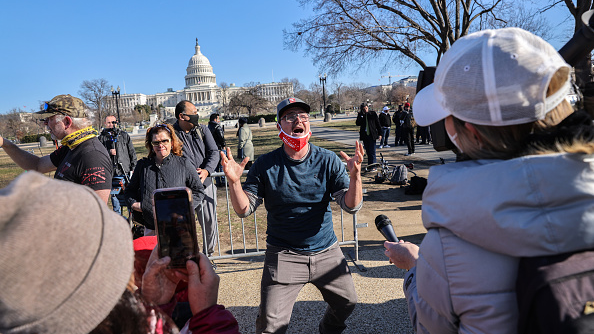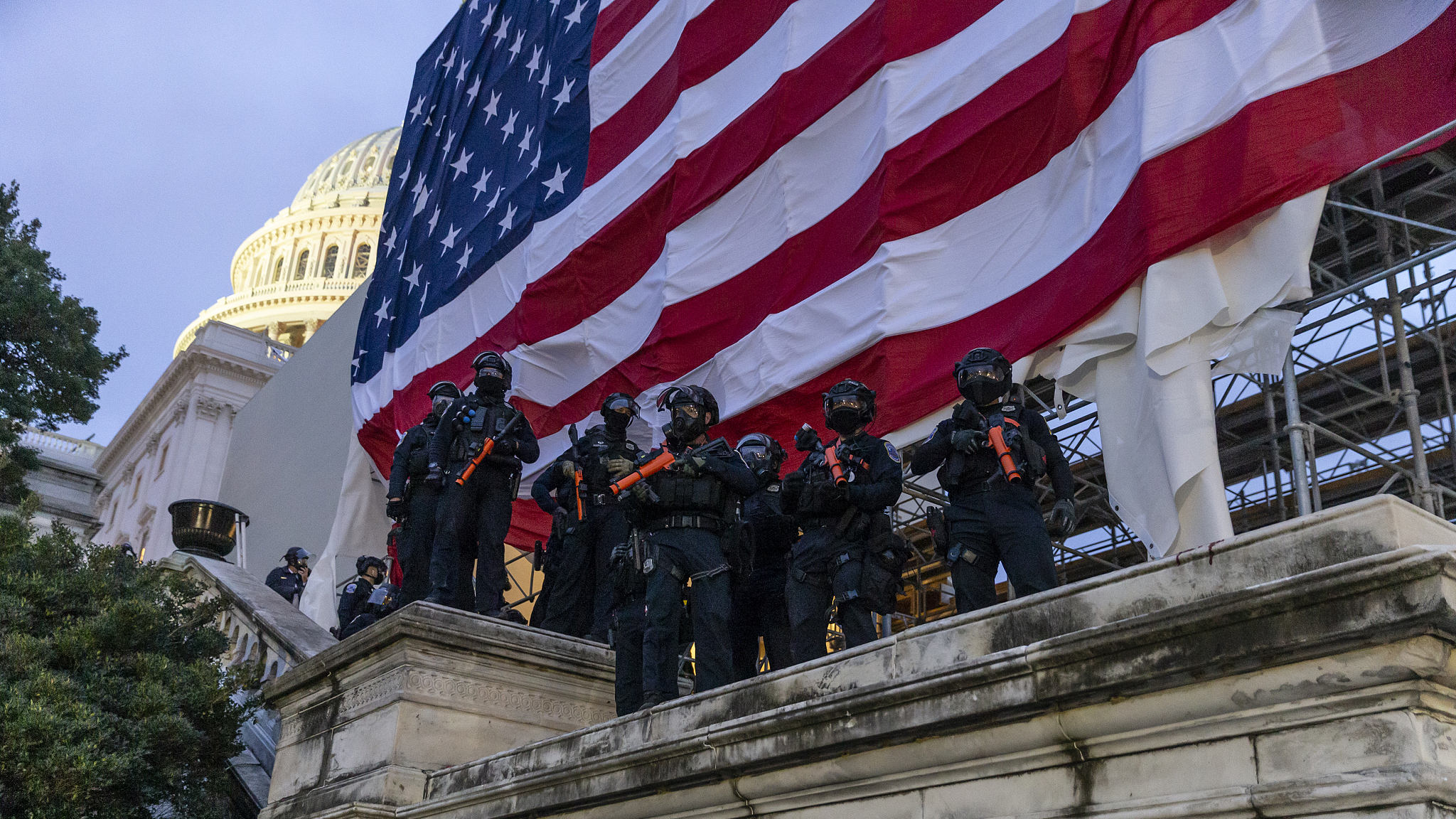
A Trump supporter complains of election fraud outside the U.S. Capitol in Washington, DC., January 7, 2021. /Getty
A Trump supporter complains of election fraud outside the U.S. Capitol in Washington, DC., January 7, 2021. /Getty
Editor's note: Jonathan Arnott is a former member of the European Parliament. The article reflects the author's opinions, and not necessarily the views of CGTN.
On October 7, 2014, I headed out of the European Parliament building in Brussels for a meeting with a journalist who was interviewing me for a forthcoming newspaper article. Just before I went back in, I received a text message and then phone calls from colleagues and staff inside the Parliament building. A large group of protesters had stormed the building and forced their way in, singing and chanting loudly.
I remember the emotional reaction. Why had it happened? How could security be so lax that it could happen? Were the protestors armed? Could this be a terrorist attack? Were my friends, colleagues and staff going to be safe? Many of them had locked themselves in their offices, not daring to come out. It transpired that the protestors were unarmed Kurds, wanting to draw attention to the rise of the so-called Islamic State.
The incident sent shockwaves through all the political groups: a sense that it could have been worse and that anyone could have done that. Security was duly tightened. So, when I heard of the storming of the U.S. Capitol building by Trump supporters, it brought back memories. I've experienced a similar situation, though on a much smaller scale.
In the immediate aftermath of these events in the United States, "whataboutery" has reached an all-time high. How does the incident and reaction to it compare with the actions of BLM protestors over the summer, when statues were toppled and buildings and police stations set on fire? How does it compare with protestors in Hong Kong?
Commentators are keen to stress the similarities and differences which advance their own cause. Grace Tsoi, for instance, published an article titled "Key differences between the U.S. and Hong Kong protests" on the BBC News website. Meanwhile, Fox News in America reported on podcast host Allie Beth Stuckey's critique of vice President-elect Kamala Harris. "This is the same woman who tweeted out a BAIL FUND for rioters who burned down Minneapolis," Fox quoted her as saying.

Police seen around the Capitol building where pro-Trump supporters rioted and breached the Capitol in Washington, D.C., January 6, 2021. /VCG
Police seen around the Capitol building where pro-Trump supporters rioted and breached the Capitol in Washington, D.C., January 6, 2021. /VCG
If one thing is clear from all this, it is that we need an objective standard by which all civil unrest should be judged. The old saying "one person's terrorist is another person's freedom-fighter" is one that easily trips off the tongue. But there can be no objective standard for determining who is right when it comes to complex geopolitical issues. I was born in the 1980s in the United Kingdom, at a time when Irish Republican Army (IRA) terror attacks were common and when a party conference was interrupted by an IRA bomb intended to kill the prime minister. Whether someone is unionist or republican when it comes to the sovereignty of Northern Ireland depends upon many factors, and disagreement on that issue continues to this day.
But we can, I think, have an objective standard to condemn terror, rioting and those protests that are so disruptive as to impact upon the liberties of others. We can also, in my view, have an objective standard that law enforcement should not be overly aggressive and that the mission of restoring law and order must succeed.
Where there is a choice between protecting rioters and protecting the innocent, it is important to err on the side of protecting the innocent. If someone storms into the U.S. Capitol building, riots on the streets, or participates in terrorist activity, they take control out of their own hands. They run a risk, however small, of losing their lives. It matters little whether protestors or rioters were armed or unarmed. That fact cannot be known to law enforcement at the time. Police must take steps to ensure public safety and restore order.
In recent days we have seen unbelievable hypocrisy from those who believe that one kind of disorder is acceptable and another not based on their own personal prejudices and the most spurious of claimed differences. It's worrying that an American opinion poll in the immediate aftermath of the recent violence showed that around 20 percent supported the rioters. Indeed, some of the polling over the summer was concerning too.
There's a temptation toward cognitive dissonance, where people see nothing wrong and excuse the actions of those they agree with while vigorously condemning the actions of their opponents. That temptation must always be resisted. Whether Left or Right, liberal or conservative, it's important to have a common approach.
My views about the specific cause should be irrelevant. In October 2014, I might well have agreed with the protestors at the European Parliament – at least about the serious nature of the threat then posed by the Islamic State. I could not, though, condone their methods.
I believe that rioting is wrong; that should not be a controversial opinion.
(If you want to contribute and have specific expertise, please contact us at opinions@cgtn.com.)

